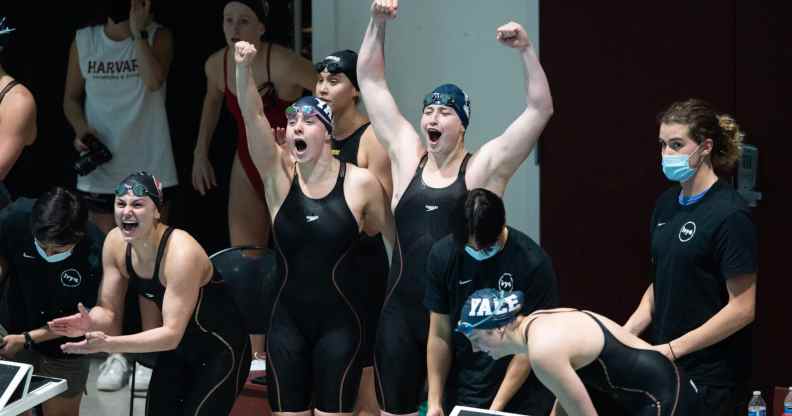Trans swimmers Iszac Henig and Lia Thomas smashes records at Ivy League Women’s Championships

Yale University swimmer Isaac Henig celebrates with his teammates after winning the 200 freestyle relay during the 2022 Ivy League Womens Swimming and Diving Championships at Blodgett Pool on February 17, 2022 in Cambridge, Massachusetts. (Kathryn Riley/Getty Images)
Trans swimmers Iszac Henig and Lia Thomas have won races and broken records at the Ivy League Women’s Championships.
Henig, a trans man who has delayed starting testosterone while he is still on the Yale team, broke the pool record for the 50-yard freestyle race by three seconds.
And Thomas, a trans woman who swims for UPenn, won the 500-yard freestyle race in four minutes and 37.32 seconds – a record for Harvard University’s Blodgett Pool – making her an Ivy League champion.
🥇🥈
Lia Thomas is the @IvyLeague champion in the 500 free. Her time of 4:37.32 is a new pool record.
Catherine Buroker finishes in second.#FightOnPenn pic.twitter.com/ki2SQdxn6Q
— Penn Swimming & Diving (@PennSwimDive) February 17, 2022
This season is 22-year-old Thomas’ first on the UPenn women’s team and she has been consistently bombarded with transphobia.
Anti-trans campaigners claim her involvement in the competition is “unfair” and other swimmers on her team have reportedly threatened to boycott meets where she was competing.
Amid the transphobic backlash – which saw critics highly confused earlier this month when Henig beat Thomas in a race – USA Swimming changed its rules on trans inclusion.
The new policy for elite trans swimmers, announced on 1 February and effective immediately, states that trans women athletes must appear before a medical panel of three people, who will assess whether “prior physical development of the athlete as a male” gives them an advantage in swimming.
Elite trans swimmers will also have to undergo testosterone testing for 36 months before competing, during which time they must continuously maintain a testosterone level below five nanomoles per litre.
The new policy is the result of “several months of internal work, critical stakeholder discussions, and medical and legal review”, USA Swimming said, and “acknowledges a competitive difference in the male and female categories and the disadvantages this presents in elite head-to-head competition”.
The rules will only apply to elite-level swimmers, and USA Swimming said it “remains steadfast in its continued commitment to greater inclusivity at the non-elite levels”.
The policy therefore doesn’t affect Lia Thomas – unless the NCAA decides to adopt it later this month.

